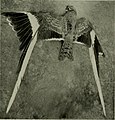English: pennant-winged nightjar (
Caprimulgus vexillarius)
Title: The American Museum journal
Identifier: americanmuseumjo15amer (find matches)
Year: c1900-(1918) (c190s)
Authors: American Museum of Natural History
Subjects: Natural history
Publisher: New York : American Museum of Natural History
Contributing Library: American Museum of Natural History Library
Digitizing Sponsor: Biodiversity Heritage Library
View Book Page: Book Viewer
About This Book: Catalog Entry
View All Images: All Images From Book
Click here to view book online to see this illustration in context in a browseable online version of this book.
Text Appearing Before Image:
BIRDS OF THE CONGO 28/ azure cuckoo-shrikes and flaming bishop-birds. The Congo furnishes some examples of birds of most remarkable instincts. The honey guide fully merits its fame for attracting men with its chattering cry and leading them to beehives in order that it may share in the spoils. A bird of the more open grass country, it greets you with an insistent " cutta-cutta-cutta-cutta!", flies off ahead, and if you have time to follow it, will take you to the hive it knows of, although you will then have to watch and listen yourself for the bees, while your informant sits quietly watching in some nearby tree. Honey guides eat a good deal of beeswax; in preparing the specimens we usually found some in their stomachs, even in those of some of the smaller related species that do not call upon man for assistance. The nesting habits of hornbills, of which we secured no fewer than ten different species, are especially curious. The eggs are laid in a hole in a tree, where the female is confined until her young are fully ready to leave, perhaps some six weeks. The entrance is partially closed with muddy material, and food is brought to her regularly by her mate; in fact the nests were discovered by watching his movements. Natives
Text Appearing After Image:
The pennant-winged nightjar (Macrodipteryx vexillarius) hunts at night in the open grass country. It assembles in flocks when the winged termites are leaving their nests at dusk stated that the female sheds all her quills from both wings and tail, during this period, and we found that in some cases at least this was true. The collector in the Congo has often great difficulty in approaching birds, especially in the great trees of the Ituri forest, where a bird on the upper branches may be one hundred and twenty feet above anyone standing beneath the tree. Yet certain species were seldom seen elsewhere, just as certain others skulked continually in dense under-brush. Since my return I have been struck by the comparative tameness of many American birds, and have wondered to what to ascribe it. Can it be that the abundance of mankind, instead of making them wary, actually causes them to become indifferent, or
Note About Images
Please note that these images are extracted from scanned page images that may have been digitally enhanced for readability - coloration and appearance of these illustrations may not perfectly resemble the original work. 

